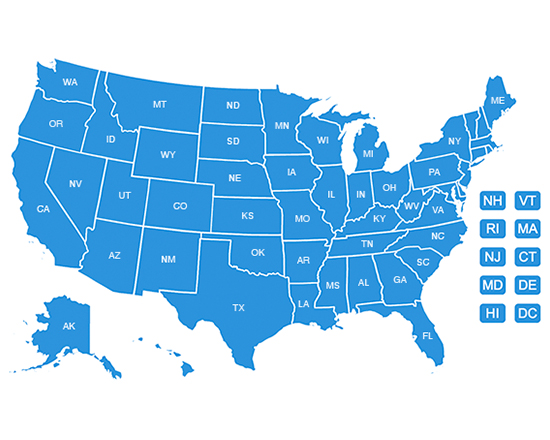The Nursing Home Law Center is committed to providing the legal resources necessary to hold negligent facilities accountable.
South Carolina Nursing Home Abuse Lawyer

Licensed in South Carolina
Nursing home abuse is a devastating reality that affects many vulnerable nursing home residents in South Carolina. The emotional toll on families and the financial burden of medical treatment can be overwhelming, making it essential to seek legal help. This specialized assistance is especially important for residents in the growing healthcare corridors of York County. If you suspect that a family member is being mistreated in a local facility, a Rock Hill Nursing Home Abuse Lawyer can provide the immediate intervention and expert guidance needed to ensure their safety and begin the process of seeking justice.
With the guidance of a South Carolina nursing home abuse lawyer, families can take action to seek compensation for their loved ones and hold negligent nursing homes accountable. This legal intervention is particularly crucial in the state capital, where complex regulatory oversight requires a deep understanding of both state and federal mandates. For families dealing with negligence in Richland County, a Columbia, SC Nursing Home Abuse Lawyer can provide the necessary legal pressure to ensure that facilities are held to the highest standards of care.
Why Hire Nursing Home Law Center
At Nursing Home Law Center, we are dedicated to obtaining justice and fair compensation for those affected by nursing home abuse. Our skilled legal team has extensive experience handling these cases with care and consistently securing substantial settlements and favorable verdicts.
We leave no stone unturned in our investigations, ensuring that all forms of abuse, from medical costs to emotional suffering and other damages, are fully accounted for. With our in-depth knowledge of nursing home abuse claims, we expertly manage every detail, working relentlessly to safeguard your rights.
Throughout the legal process, we offer compassionate guidance and clear communication, ensuring that you and your loved ones remain informed, supported, and confident as we work to achieve justice. Our firm is dedicated to serving the Lowcountry region, where senior care facilities must adhere to strict safety protocols to protect their residents. Working with a Charleston, SC Nursing Home Abuse Lawyer allows families to effectively investigate claims of medical malpractice or physical neglect and pursue the maximum compensation allowed under South Carolina law.
Types of Cases Handled by Our South Carolina Nursing Home Abuse Lawyers
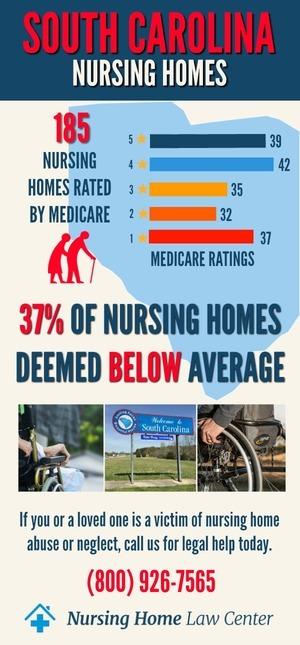
Nursing home abuse refers to any action that causes harm, pain, or suffering to a nursing home resident. This abuse can take many forms, affecting the physical, emotional, and financial well-being of vulnerable individuals.
At Nursing Home Law Center, our South Carolina nursing home abuse lawyers are well-versed in handling various types of abuse cases to protect the rights of residents and their families.
Physical Abuse
Physical abuse involves the intentional use of force that results in injury or pain. This can include hitting, slapping, or pushing, as well as the improper use of restraints, which can cause severe impairment.
Mental and Emotional Abuse
Emotional abuse includes verbal threats, harassment, humiliation, and isolation. These actions can lead to severe emotional distress for victims, impacting their mental health and overall well-being.
Sexual Abuse
Sexual abuse involves any non-consensual sexual contact. Many victims of this horrifying violation of dignity often suffer in silence. Our abuse and neglect lawyers work to bring these cases to light and ensure the perpetrators are held responsible.
Medical Malpractice
Medical malpractice includes the failure to provide proper medical care. Common examples include medication errors, such as administering the wrong medication or incorrect dose, and bed sores (pressure ulcers). These instances are widespread in nursing homes with staffing shortages.
Negligence
Nursing home negligence occurs when caregivers fail to provide adequate care or supervision, harming or injuring residents. This can include poor hygiene, malnutrition, dehydration, and elopement (residents wandering away from the facility).
Financial Abuse
Financial abuse occurs when nursing home staff members or other residents use a resident’s funds or assets without authorization. This can include stealing money, misusing bank accounts, or coercing them into signing financial documents.
Wrongful Death
In the most tragic cases, nursing home abuse can lead to a resident’s death. Whether due to abuse, medical malpractice, or neglect, we pursue wrongful death claims on behalf of families who have lost their loved ones, seeking justice and accountability for these heartbreaking losses.
Understanding Your Legal Rights
Federal and state laws protect nursing home residents, ensuring their right to live in a safe and dignified environment. These laws are designed to prevent nursing home abuse, neglect, and exploitation while holding facilities accountable for any violations.
The Nursing Home Reform Act of 1987 is a landmark federal law that sets the standard for care in nursing homes across the United States. This act requires facilities that receive Medicare and Medicaid funding to provide services that promote residents’ physical, mental, and social well-being.
It outlines explicitly residents’ rights to be free from physical, sexual, and emotional abuse. It also mandates proper medical treatment, including the prevention of bedsores, and ensures that nursing home staff members meet specific qualifications to provide care.
In addition to federal protections, South Carolina nursing homes are governed by state laws that further protect nursing home residents.
The South Carolina Department of Health and Environmental Control (DHEC) regulates and licenses nursing homes. The state requires these facilities to maintain adequate staffing, provide appropriate care, and create a safe environment for residents. Maintaining these standards is a mandatory legal requirement that many facilities overlook during periods of rapid expansion. If your family member has suffered due to unsafe conditions or staffing shortages in Berkeley or Charleston County, a North Charleston Nursing Home Abuse Lawyer can help you file a formal claim and hold the administration accountable for their negligence.
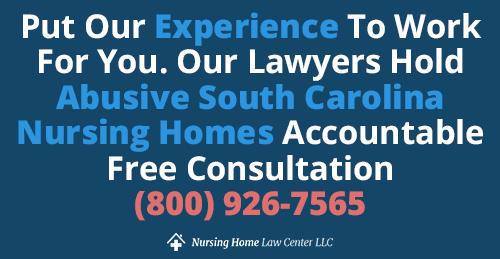
Eligibility to File a Nursing Home Abuse Claim
In nursing home abuse cases, the residents themselves can file a civil lawsuit against the facility that violated their rights. If the resident cannot file due to incapacity, a legal guardian or a family member with power of attorney can act on their behalf. In cases of wrongful death, the estate of the deceased resident can pursue legal action against the facility.
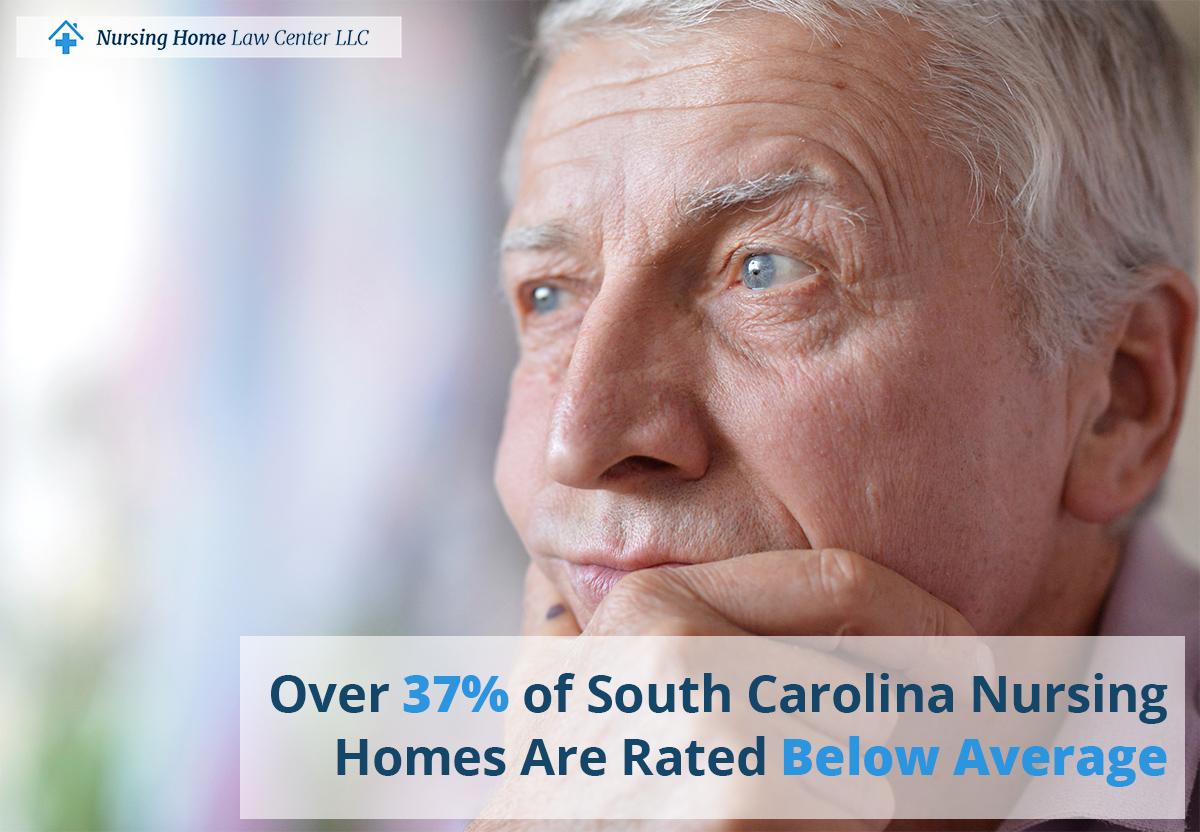
Liability in Nursing Home Neglect and Abuse Cases
In nursing home abuse cases, liability may not rest solely on one individual or entity. Multiple parties can be responsible for the harm inflicted on a nursing home resident, depending on the circumstances of the abuse.
- Nursing Home Staff Members: Nursing home staff members, including certified nursing assistants (CNAs), nurses, and caregivers, may be directly responsible for abuse or neglect. The individual accountable for the abuse can face civil penalties and, in some instances, criminal charges.
- Nursing Home Administration: A South Carolina nursing home’s management or administrative staff may be held liable if they fail to supervise employees or provide adequate training that leads to abuse.
- Third-Party Contractors: Some nursing homes employ third-party contractors, such as visiting doctors, therapists, or maintenance personnel. If one of these individuals engages in nursing home abuse, they may also be held liable.
- Parent Companies or Ownership Groups: Many nursing homes are part of larger corporations or ownership groups. These parent companies may be held liable if their policies, cost-cutting measures, or lack of oversight contribute to the abuse or neglect of residents.
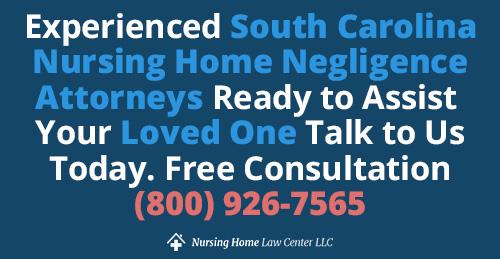
How Our South Carolina Nursing Home Abuse Attorneys Can Help
At Nursing Home Law Center, our dedicated team of nursing home neglect attorneys has extensive experience representing victims of nursing home abuse and their families.
We understand the devastating impact that nursing home abuse can have on residents and their loved ones and are committed to securing justice and compensation for those who have suffered.
Our law firm has successfully handled countless nursing home abuse cases, guiding families through the legal process with compassionate and skilled representation.
Here’s how our South Carolina injury lawyers can assist you:
Free Case Evaluation
We begin with a free case evaluation, during which our attorneys listen to your concerns, review the details of the potential nursing home abuse case, and provide an honest assessment of your legal options. This free consultation ensures that families have access to legal advice without financial risk.
Case Investigation
Our legal team conducts thorough investigations into the circumstances surrounding the abuse. This involves gathering evidence, interviewing witnesses, reviewing medical records, and assessing the conditions of the nursing home or assisted living facility. We meticulously examine all relevant factors to build a strong case against those responsible for the harm.
Filing the Claim
Once we have gathered sufficient evidence, our attorneys will prepare and file the legal claim on your behalf. We ensure the claim is filed within the appropriate time frame and complies with all legal requirements in South Carolina. We aim to hold the nursing home, its staff, or any other liable parties accountable for their actions.
Settlement Negotiation
Many nursing home abuse cases are resolved through settlement negotiations before going to trial. Our attorneys are skilled negotiators who will fight for a fair and just settlement that compensates you for the physical, emotional, and financial harm caused by the abuse. We work tirelessly to achieve the best possible outcome for you and your family.
Trial Representation
Our attorneys are fully prepared to take your case to trial if a fair settlement cannot be reached. As experienced trial lawyers, we will present your case before a judge and jury, advocating fiercely to secure justice for your loved one. We will be by your side throughout the trial process, ensuring your voice is heard and your rights are protected.
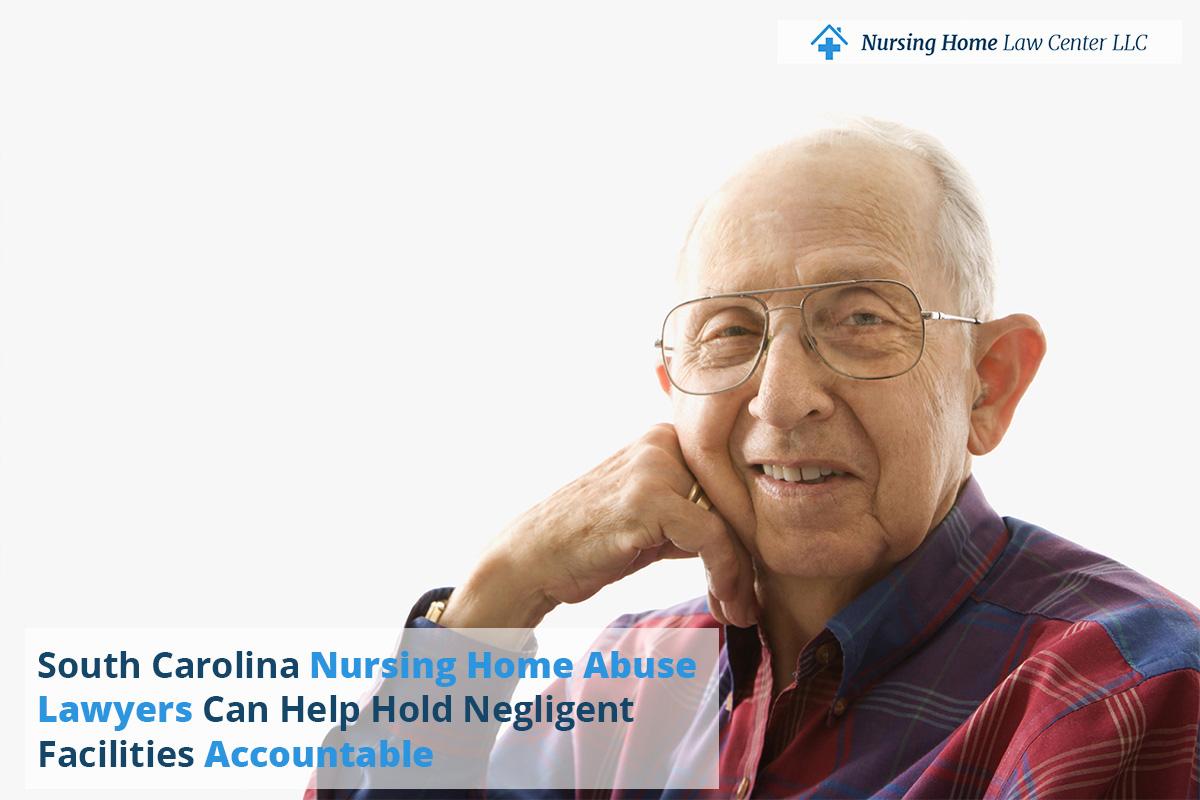
Common Signs of Elder Abuse Among Nursing Home Residents
There are 189 Medicare-certified nursing homes in South Carolina, and 88 of these facilities (46.6%) have an overall rating below or much below average. Specifically, 82 nursing homes (43.3%) fall short in health inspections, and 88 facilities (46.6%) need more staffing. Sixty facilities (31.7%) were rated poorly regarding quality measures. [1]
Recognizing the signs of nursing home abuse can be challenging, especially when victims are unable or afraid to speak out. However, specific physical, emotional, and financial indicators may suggest that a nursing home resident is being mistreated. Families and loved ones should be vigilant in identifying these warning signs to protect their loved ones from further harm:
- Unexplained injuries, such as bruises, cuts, or fractures
- Marks from restraints on the wrists or ankles
- Sudden or frequent falls without reasonable explanation
- Unexplained fear, anxiety, or depression
- Avoidance of specific nursing home staff members
- Expressions of helplessness or emotional distress
- Changes in sleep patterns or unusual agitation
- Unexplained genital infections or sexually transmitted diseases
- Bruising or bleeding in sensitive areas
- Torn clothing or undergarments
- Poor personal hygiene
- Untreated bedsores or other medical conditions
- Unsanitary living conditions
- Sudden weight loss, malnutrition, or dehydration
- Wandering or elopement from the facility without staff noticing
- Unexplained withdrawals from bank accounts
- Missing personal belongings or cash
- Changes in wills, property titles, or other financial documents
- Sudden unpaid bills despite having sufficient funds
The worst-rated nursing homes in South Carolina include:
| Anchor Post Acute | Ashley River Healthcare |
| Bennettsville Health and Rehabilitation Center | Blue Ridge IN Georgetown |
| Brian Center Nursing Care – St Andrews | Brightwater Skilled Nursing Center |
| Calhoun Convalescent Center | Carlyle Senior Care of Aiken |
| Carlyle Senior Care of Blackville | Carlyle Senior Care of Florence |
| C M Tucker Jr Nursing Care Center Fewell and Stone | Condor Health Anderson |
| Edisto Post Acute | Heartland of Columbia Rehab and Nursing Center |
| Heritage Home of Florence Inc | Inman Healthcare |
| Johns Island Post Acute | Lake City Scranton Healthcare Center |
| Lake Emory Post Acute Care | Magnolia Manor – Inman |
| Magnolia Manor – Rock Hill | Magnolia Manor – Spartanburg |
| Martha Franks Baptist Retirement Center | Midlands Health & Rehabilitation Center |
| Musc Health Mullins Nursing Home | Oak Hollow of Sumter Rehabilitation Center |
| Patewood Post Acute | Physical Rehabilitation and Wellness Center of Spa |
| Pruitthealth- Aiken | Pruitthealth- Columbia |
| Pruitthealth- Conway at Conway Medical Center | Pruitthealth- Dillon |
| Pruitthealth- Estill | Pruitthealth- Walterboro |
| Resorts at Beaufort | Ridgeland Nursing Center Inc |
| Ridgeway Manor Healthcare Center | Riverside Health and Rehab |
| Sandpiper Post Acute | Skylyn Nursing and Rehabilitation Center |
| Southpointe Healthcare and Rehabilitation | Springdale Healthcare Center |
| St George Healthcare Center | Sumter East Health & Rehabilitation Center |
| The Reserve Healthcare and Rehabilitation | Valley Falls Terrace |
| West Village Post Acute |
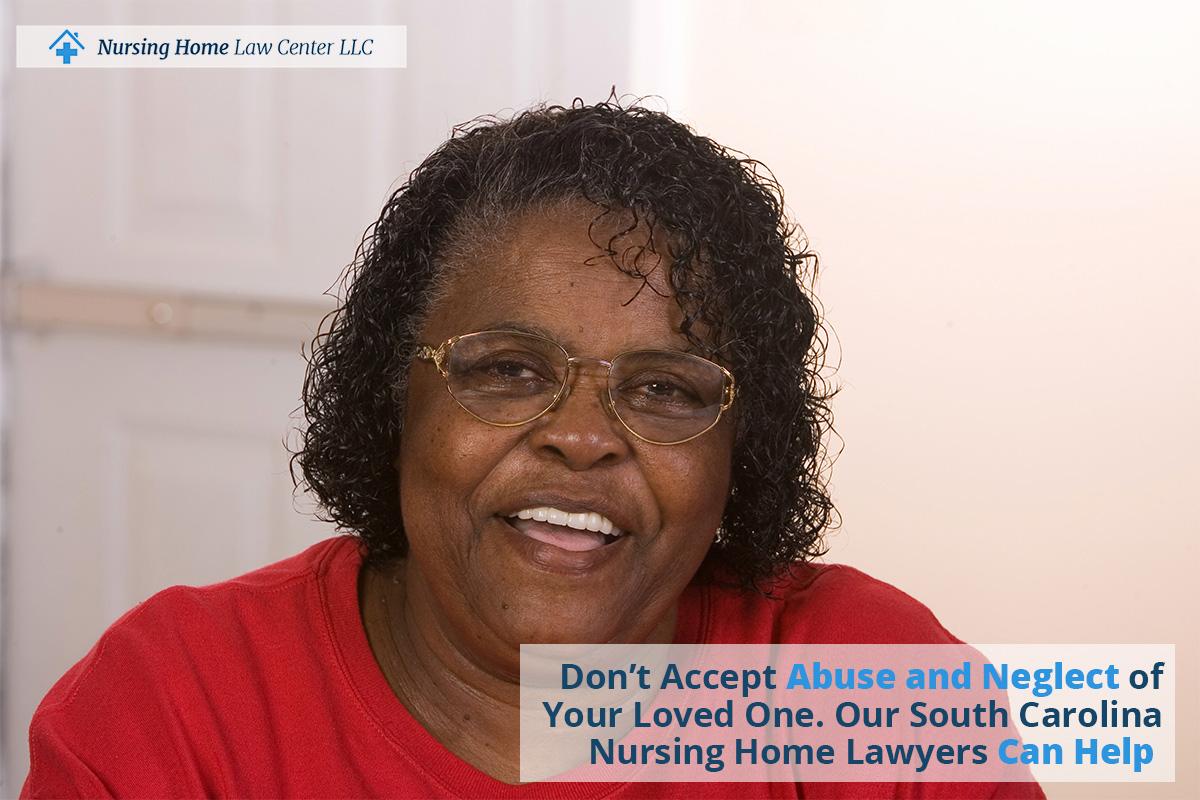
What to Do If You Suspect Nursing Home Abuse
If you believe that a loved one is being abused in a South Carolina nursing home, taking immediate action is crucial. Here are the steps you should follow to protect your loved one and ensure their safety:
- Call 911 if Immediate Danger is Present: If your loved one is in danger or needs urgent medical attention, contact 911 immediately. Law enforcement and emergency medical services can step in to ensure their safety and document any evidence of abuse.
- Report to Nursing Home Administrator or Management: The management or administrative staff oversees the care provided at the facility and should take your report seriously. Document your complaint in writing and keep copies for your records.
- File a Complaint with Your Local Ombudsman’s Office: The Ombudsman investigates complaints of abuse, neglect, or poor living conditions and helps resolve the issue.
- Contact a Nursing Home Abuse Lawyer: A skilled attorney will help you understand your rights, gather evidence, and file a nursing home abuse case to seek justice and compensation for your loved one’s suffering.
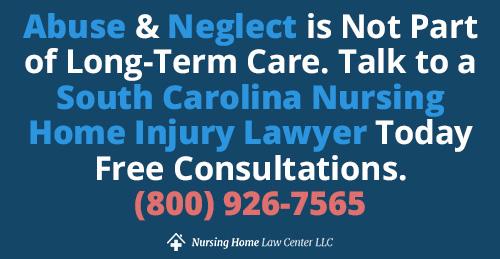
The Cost of Hiring a South Carolina Nursing Home Abuse Lawyer
At Nursing Home Law Center, we understand the financial burdens that families face when dealing with nursing home abuse. That’s why we operate on a contingency fee basis.
When hiring a South Carolina nursing home abuse lawyer, you do not have to worry about upfront expenses. Our law firm only gets paid if we successfully secure your compensation through a settlement or court verdict.
This approach ensures everyone can access quality legal representation regardless of financial situation.
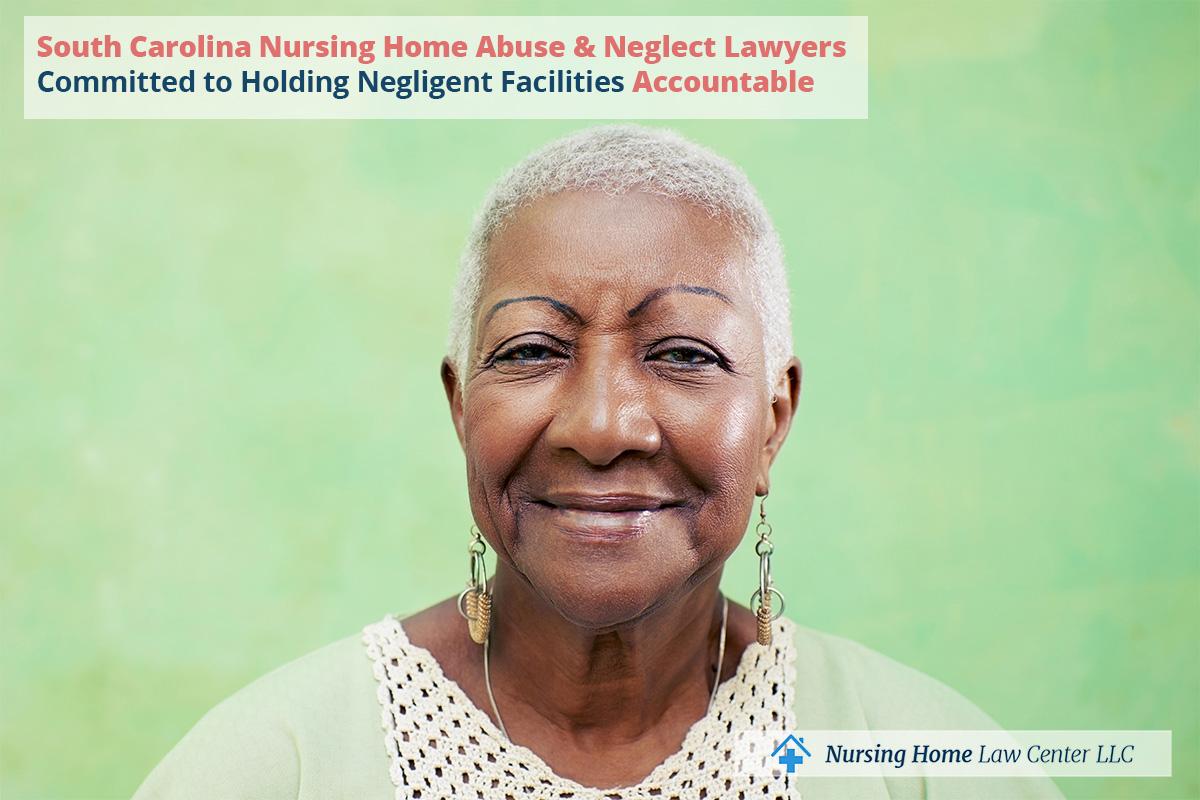
You Have Limited Time to Take Legal Action in South Carolina
In most cases, the statute of limitations for nursing home abuse cases in South Carolina is three years from the date the abuse occurred or was discovered. It is crucial to act quickly, as missing this deadline can result in losing your right to file a claim and seek compensation.
Certain circumstances, such as cases involving wrongful death, may have additional considerations, making it essential to consult a South Carolina nursing home abuse lawyer as soon as possible.
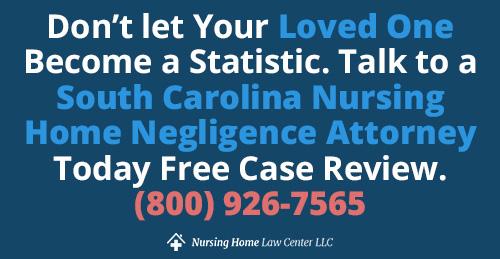
Contact a South Carolina Nursing Home Abuse Attorney Today!
At Nursing Home Law Center, our experienced team of South Carolina nursing home abuse lawyers is dedicated to fighting for the rights of vulnerable residents and their families.
With a proven track record of handling complex nursing home abuse cases, we have successfully secured significant settlements and verdicts for nursing home abuse victims. Our attorneys are ready to provide the compassionate support your family needs during this difficult time. For residents and families in the East Cooper area, a Mount Pleasant Nursing Home Abuse Lawyer from our firm will offer personalized attention and aggressive representation to ensure that negligent care providers are held legally accountable for their actions.
Call us at (800) 926-7565 or fill out our contact form.
References: [1] Medicare


